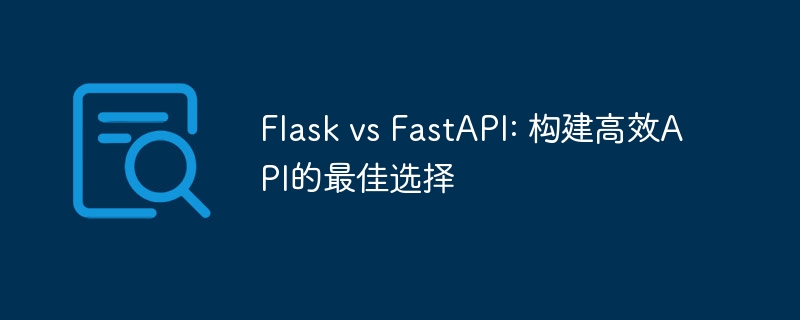

Flask vs FastAPI: The best choice for building efficient APIs, specific code examples are required
Introduction:
With the development of the Internet, APIs have become modern applications One of the core components of the program. Building APIs that are efficient, reliable, and easy to develop is one of the top priorities for developers. In the Python field, the two most popular web frameworks, Flask and FastAPI, are widely used to build APIs. This article will compare the two frameworks and give code examples to illustrate their differences to help developers choose the framework that best suits their projects.
Sample code:
from flask import Flask, jsonify app = Flask(__name__) @app.route('/hello') def hello(): return jsonify({'message': 'Hello, World!'}) if __name__ == '__main__': app.run()
Sample code:
from fastapi import FastAPI app = FastAPI() @app.get('/hello') async def hello(): return {'message': 'Hello, World!'} if __name__ == '__main__': import uvicorn uvicorn.run(app)
asynciolibrary introduced in Python 3.7 to implement High-performance asynchronous IO operations. In contrast, Flask uses a synchronous model and cannot fully utilize the concurrency capabilities of multi-core CPUs and network IO. FastAPI generally performs better than Flask, especially when handling large numbers of concurrent requests.Sample code:
from fastapi import FastAPI from pydantic import BaseModel app = FastAPI() class Item(BaseModel): name: str price: float @app.post('/items/') async def create_item(item: Item): """ Create item """ return item if __name__ == '__main__': import uvicorn uvicorn.run(app)
Conclusion:
In summary, choosing the API framework suitable for your project depends on the developer's needs and preferences. If you like a simple, customizable and flexible framework, then Flask is a good choice. However, if you are looking for high performance, powerful parameter validation and document generation functions, then FastAPI may be more suitable for you. No matter which framework you choose, through the code examples given in this article, you can better understand their characteristics and make informed decisions based on your own project needs.
Extended reading:
The above is the detailed content of Flask vs FastAPI: The best choice for building efficient APIs. For more information, please follow other related articles on the PHP Chinese website!
 How to convert ape to wav
How to convert ape to wav The latest price of fil currency
The latest price of fil currency Introduction to screenshot shortcut keys in Windows 7 system
Introduction to screenshot shortcut keys in Windows 7 system How to obtain the serial number of a physical hard disk under Windows
How to obtain the serial number of a physical hard disk under Windows Thunder vip patch
Thunder vip patch How about Binance exchange?
How about Binance exchange? What are the css3 gradient properties?
What are the css3 gradient properties? How to install linux system
How to install linux system



